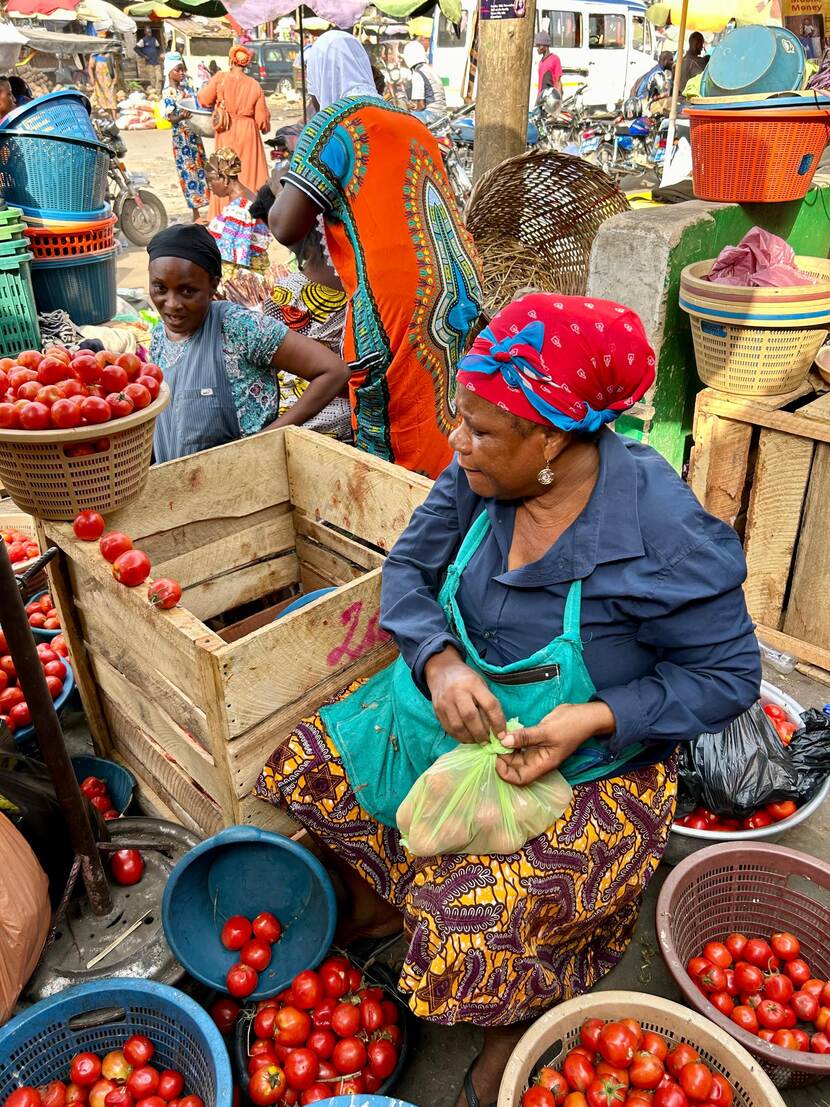2024 Election Showdown: Analyzing Agricultural Policies in Ghana’s Leading Party Manifestos
As Ghana prepares for the 2024 elections on December 7th, the New Patriotic Party (NPP) and the National Democratic Congress (NDC) have unveiled their plans for the country. Both parties emphasize job creation, with the NPP aiming to create one million jobs through digital skills, construction, and agribusiness, while the NDC focuses on industrialization and agriculture. The agricultural policies they propose will be crucial in helping voters decide, especially those involved in farming or connected to the agricultural sector. Our team took sometime to examine and compare the agricultural policies in both parties’ plans, considering how they might impact farming and the broader Ghanaian economy.
Agriculture remains a cornerstone of Ghana's economy, contributing significantly to Gross Domestic Product (GDP) and employment. Ghana's agricultural sector is dominated by smallholder farmers who primarily engage in the cultivation of crops (cocoa, maize, rice, and other staple crops) and livestock. They largely drive their livelihood from this sector in term of food and income. Despite its importance, the sector faces numerous challenges, including inadequate infrastructure, limited access to credit, and climate change impacts. Over the years, successive governments have introduced various policies to address these challenges, with varying degrees of success.
Ghana's agricultural sector is dominated by smallholder farmers who primarily engage in the cultivation of crops and rearing of livestock.

Overview of NPP’s agricultural policies
The NPP, currently the ruling party, has historically focused on modernizing agriculture through technology and infrastructure development. Their 2024 manifesto continues this trend, emphasizing the creation of a world-class digital economy to drive growth, innovation and efficiency. The NPP plans to create jobs in agribusiness by modernizing agriculture, expanding irrigation, and supporting the entire agricultural value chain. This includes providing financial support to agropreneurs and expanding agricultural exports.
- Expansion of Planting for Food and Jobs (PFJ): The NPP plans to scale up the PFJ program, which has been its flagship initiative since 2017. This will involve increasing the number of beneficiaries and extending support to include more crops beyond the current focus.
- Agricultural mechanization: The party proposes to increase access to modern farming equipment by establishing more agricultural mechanization centres across the country. This policy aims to reduce the labour-intensive nature of farming in Ghana, thereby increasing productivity.
- Irrigation development: the NPP plans to invest heavily in irrigation infrastructure in recognition of the impact of erratic rainfall patterns on agriculture. The manifesto outlines a plan to complete ongoing projects like the Pwalugu Multipurpose Dam and initiate new ones to cover more arable land.
- Youth in agriculture: the NPP proposes targeted initiatives such as providing start-up capital, training, and mentorship. The goal is to make agriculture a more attractive and viable career option for young Ghanaians.
- Cocoa sector initiatives: The NPP proposes to increasing cocoa production through various initiatives, including the provision of high-yielding seedlings, supporting research into disease-resistant cocoa varieties, and enhancing the Cocoa Farmers’ Pension Scheme. Additionally, the party promises to improve the Cocoa Roads project to facilitate better transportation of cocoa beans from farms to processing centres. Specifically on youth and women, the NPP promises to launch a Youth and Women in Cocoa Farming Program to promote greater involvement and sustainability of the sector.
"Over the years, successive governments have introduced various policies to address these challenges, with varying degrees of success"
Overview of NDC’s Agricultural Policies
The NDC’s 2024 vision for Ghana highlights a 24-hour economy and industrialization as key drivers of growth, with a focus on manufacturing and agriculture. Their strategy for job creation in agriculture includes mechanization, farmer subsidies, and agro-processing zones, aiming to boost employment across the agricultural value chain.
- Feed Ghana Programme: They plan to launch a "Feed Ghana Programme" aimed at increasing agricultural productivity through the use of improved seeds, fertilizers, and sustainable farming practices. This policy seems draws inspiration from successful agricultural transformations in countries like India and Brazil. It can also be said to more like the NDC version of the “Planting for Food and Jobs’ initiative of the NPP.
- Agricultural Modernization and Value Addition: The NDC emphasizes the need to move beyond primary production to value addition. Their manifesto proposes the establishment of agro-processing zones and factories to process raw agricultural produce into finished goods for both local consumption and export.
- Support for Smallholder Farmers: Recognizing the central role of smallholder farmers in Ghana's agriculture, the NDC manifesto promises to provide them with better access to credit, insurance, and extension services. This support is aimed at reducing the risks associated with farming and ensuring a more stable income for farmers.
- Climate-Resilient Agriculture: In response to the growing threat of climate change, the NDC proposes to promote climate-smart agriculture practices. This includes encouraging the adoption of drought-resistant crop varieties and supporting afforestation and reforestation efforts to combat desertification.
- Cocoa Sector Development: The NDC proposes increasing investment in cocoa research and development, particularly in breeding new, disease-resistant varieties and improving cocoa farming techniques. The party also aims to enhance the welfare of cocoa farmers through better pricing mechanisms and expanding access to healthcare and education for farming communities. Additionally, the NDC aims to engage the youth in cocoa farming by introducing a comprehensive support initiative called "Youth in Cocoa Farming."
"The 2024 manifestos of the NPP and NDC offer distinct but complementary visions for Ghana's agricultural future. As the election approaches, these policies will play a crucial role in shaping the sector, especially in the vital cocoa industry"
Comparative Analysis of NPP and NDC Agricultural Policies
The manifestos suggest an understanding by both parties of the critical challenges facing Ghana’s agricultural sector, but they differ in their proposed approaches to address the issues. The NPP orientation is more towards modernization and market-oriented solutions, while the NDC emphasizes social inclusive growth and sustainability.
- Modernization vs. inclusion: the NPP’s policies could lead to significant advancements in agricultural productivity and value addition, particularly if their initiatives on mechanization and agro-processing are successfully implemented. However, the NDC’s focus on financing, farmer welfare, and sustainability could ensure more equitable growth and resilience against environmental challenges.
- Focus on modernization: while both parties emphasize modernization, the NPP’s approach is more technology-driven, focusing on mechanization and irrigation. In contrast, the NDC places greater emphasis on value addition and agro-processing.
- Youth engagement: the NPP’s policies appear more targeted towards engaging the youth in agriculture through specific programs and incentives. The NDC, while also recognizing the importance of youth involvement, focuses more broadly on supporting smallholder farmers.
- Climate change adaptation: the NDC manifesto provides a more detailed plan for addressing climate change impacts on agriculture, with specific references to climate-smart practices. The NPP, on the other hand, focuses more on infrastructure development, which could indirectly mitigate some climate-related risks.
- Cocoa Sector: in the cocoa sector, both parties propose commendable strategies, but the success of these policies will depend on effective implementation. The NPP’s infrastructure and technology-driven approach could increase yields, while the NDC’s emphasis on research and social welfare could lead to longer-term sustainability and improved living standards for cocoa farmers. With the cocoa sector current in crisis in terms of productivity and financing, the question that need to be ask is how the proposed initiatives will be funded in the short-term.
Potential impacts on Ghana's agricultural sector
The successful implementation of the NPP or NDC's policies could significantly transform Ghana's agricultural sector. The NPP’s focus on technology and infrastructure could lead to increased productivity and efficiency, especially in staple crop production. However, this approach may require substantial investment and could face challenges in reaching the most remote and underserved farming communities.
The NDC's emphasis on value addition and climate resilience could help diversify Ghana's agricultural exports and make the sector more sustainable in the long term. However, the success of these policies would depend on effective coordination between government agencies and the private sector, as well as the ability to mobilize the necessary resources.

Conclusion
Both parties aim to transform Ghana's agricultural sector. However, growth is impeded by several factors, including natural limitations, reliance on gold revenues, and historical neglect. The sector’s focus on cash crops and staple foods, coupled with challenging agroecological conditions and slow technology adoption, has also hindered progress.
The 2024 manifestos of the NPP and NDC offer distinct but complementary visions for Ghana's agricultural future. As the election approaches, these policies will play a crucial role in shaping the sector, especially in the vital cocoa industry. The choice between modernization and inclusion, productivity and sustainability will be central to the electoral decision for Ghanaian voters.
Ultimately, the election's outcome will significantly influence the future trajectory of Ghana's agricultural development, impacting both the sector's growth and the broader economy in the years to come.
References
New Patriotic Party (NPP) 2024 Manifesto.
National Democratic Congress (NDC) 2024 Manifesto.